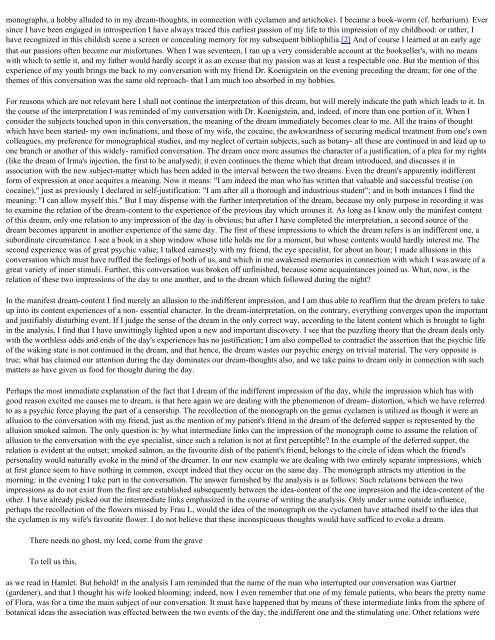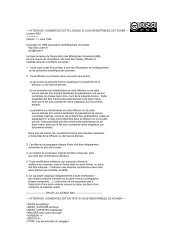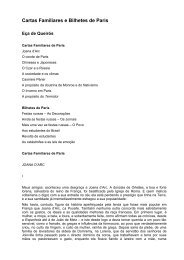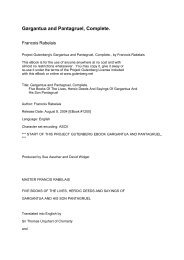The Interpretation of Dreams Sigmund Freud (1900)
The Interpretation of Dreams Sigmund Freud (1900)
The Interpretation of Dreams Sigmund Freud (1900)
You also want an ePaper? Increase the reach of your titles
YUMPU automatically turns print PDFs into web optimized ePapers that Google loves.
monographs, a hobby alluded to in my dream-thoughts, in connection with cyclamen and artichoke). I became a book-worm (cf. herbarium). Ever<br />
since I have been engaged in introspection I have always traced this earliest passion <strong>of</strong> my life to this impression <strong>of</strong> my childhood: or rather, I<br />
have recognized in this childish scene a screen or concealing memory for my subsequent bibliophilia.[2] And <strong>of</strong> course I learned at an early age<br />
that our passions <strong>of</strong>ten become our misfortunes. When I was seventeen, I ran up a very considerable account at the bookseller's, with no means<br />
with which to settle it, and my father would hardly accept it as an excuse that my passion was at least a respectable one. But the mention <strong>of</strong> this<br />
experience <strong>of</strong> my youth brings me back to my conversation with my friend Dr. Koenigstein on the evening preceding the dream; for one <strong>of</strong> the<br />
themes <strong>of</strong> this conversation was the same old reproach- that I am much too absorbed in my hobbies.<br />
For reasons which are not relevant here I shall not continue the interpretation <strong>of</strong> this dream, but will merely indicate the path which leads to it. In<br />
the course <strong>of</strong> the interpretation I was reminded <strong>of</strong> my conversation with Dr. Koenigstein, and, indeed, <strong>of</strong> more than one portion <strong>of</strong> it. When I<br />
consider the subjects touched upon in this conversation, the meaning <strong>of</strong> the dream immediately becomes clear to me. All the trains <strong>of</strong> thought<br />
which have been started- my own inclinations, and those <strong>of</strong> my wife, the cocaine, the awkwardness <strong>of</strong> securing medical treatment from one's own<br />
colleagues, my preference for monographical studies, and my neglect <strong>of</strong> certain subjects, such as botany- all these are continued in and lead up to<br />
one branch or another <strong>of</strong> this widely- ramified conversation. <strong>The</strong> dream once more assumes the character <strong>of</strong> a justification, <strong>of</strong> a plea for my rights<br />
(like the dream <strong>of</strong> Irma's injection, the first to be analysed); it even continues the theme which that dream introduced, and discusses it in<br />
association with the new subject-matter which has been added in the interval between the two dreams. Even the dream's apparently indifferent<br />
form <strong>of</strong> expression at once acquires a meaning. Now it means: "I am indeed the man who has written that valuable and successful treatise (on<br />
cocaine)," just as previously I declared in self-justification: "I am after all a thorough and industrious student"; and in both instances I find the<br />
meaning: "I can allow myself this." But I may dispense with the further interpretation <strong>of</strong> the dream, because my only purpose in recording it was<br />
to examine the relation <strong>of</strong> the dream-content to the experience <strong>of</strong> the previous day which arouses it. As long as I know only the manifest content<br />
<strong>of</strong> this dream, only one relation to any impression <strong>of</strong> the day is obvious; but after I have completed the interpretation, a second source <strong>of</strong> the<br />
dream becomes apparent in another experience <strong>of</strong> the same day. <strong>The</strong> first <strong>of</strong> these impressions to which the dream refers is an indifferent one, a<br />
subordinate circumstance. I see a book in a shop window whose title holds me for a moment, but whose contents would hardly interest me. <strong>The</strong><br />
second experience was <strong>of</strong> great psychic value; I talked earnestly with my friend, the eye specialist, for about an hour; I made allusions in this<br />
conversation which must have ruffled the feelings <strong>of</strong> both <strong>of</strong> us, and which in me awakened memories in connection with which I was aware <strong>of</strong> a<br />
great variety <strong>of</strong> inner stimuli. Further, this conversation was broken <strong>of</strong>f unfinished, because some acquaintances joined us. What, now, is the<br />
relation <strong>of</strong> these two impressions <strong>of</strong> the day to one another, and to the dream which followed during the night?<br />
In the manifest dream-content I find merely an allusion to the indifferent impression, and I am thus able to reaffirm that the dream prefers to take<br />
up into its content experiences <strong>of</strong> a non- essential character. In the dream-interpretation, on the contrary, everything converges upon the important<br />
and justifiably disturbing event. If I judge the sense <strong>of</strong> the dream in the only correct way, according to the latent content which is brought to light<br />
in the analysis, I find that I have unwittingly lighted upon a new and important discovery. I see that the puzzling theory that the dream deals only<br />
with the worthless odds and ends <strong>of</strong> the day's experiences has no justification; I am also compelled to contradict the assertion that the psychic life<br />
<strong>of</strong> the waking state is not continued in the dream, and that hence, the dream wastes our psychic energy on trivial material. <strong>The</strong> very opposite is<br />
true; what has claimed our attention during the day dominates our dream-thoughts also, and we take pains to dream only in connection with such<br />
matters as have given us food for thought during the day.<br />
Perhaps the most immediate explanation <strong>of</strong> the fact that I dream <strong>of</strong> the indifferent impression <strong>of</strong> the day, while the impression which has with<br />
good reason excited me causes me to dream, is that here again we are dealing with the phenomenon <strong>of</strong> dream- distortion, which we have referred<br />
to as a psychic force playing the part <strong>of</strong> a censorship. <strong>The</strong> recollection <strong>of</strong> the monograph on the genus cyclamen is utilized as though it were an<br />
allusion to the conversation with my friend, just as the mention <strong>of</strong> my patient's friend in the dream <strong>of</strong> the deferred supper is represented by the<br />
allusion smoked salmon. <strong>The</strong> only question is: by what intermediate links can the impression <strong>of</strong> the monograph come to assume the relation <strong>of</strong><br />
allusion to the conversation with the eye specialist, since such a relation is not at first perceptible? In the example <strong>of</strong> the deferred supper, the<br />
relation is evident at the outset; smoked salmon, as the favourite dish <strong>of</strong> the patient's friend, belongs to the circle <strong>of</strong> ideas which the friend's<br />
personality would naturally evoke in the mind <strong>of</strong> the dreamer. In our new example we are dealing with two entirely separate impressions, which<br />
at first glance seem to have nothing in common, except indeed that they occur on the same day. <strong>The</strong> monograph attracts my attention in the<br />
morning: in the evening I take part in the conversation. <strong>The</strong> answer furnished by the analysis is as follows: Such relations between the two<br />
impressions as do not exist from the first are established subsequently between the idea-content <strong>of</strong> the one impression and the idea-content <strong>of</strong> the<br />
other. I have already picked out the intermediate links emphasized in the course <strong>of</strong> writing the analysis. Only under some outside influence,<br />
perhaps the recollection <strong>of</strong> the flowers missed by Frau L, would the idea <strong>of</strong> the monograph on the cyclamen have attached itself to the idea that<br />
the cyclamen is my wife's favourite flower. I do not believe that these inconspicuous thoughts would have sufficed to evoke a dream.<br />
<strong>The</strong>re needs no ghost, my lord, come from the grave<br />
To tell us this,<br />
as we read in Hamlet. But behold! in the analysis I am reminded that the name <strong>of</strong> the man who interrupted our conversation was Gartner<br />
(gardener), and that I thought his wife looked blooming; indeed, now I even remember that one <strong>of</strong> my female patients, who bears the pretty name<br />
<strong>of</strong> Flora, was for a time the main subject <strong>of</strong> our conversation. It must have happened that by means <strong>of</strong> these intermediate links from the sphere <strong>of</strong><br />
botanical ideas the association was effected between the two events <strong>of</strong> the day, the indifferent one and the stimulating one. Other relations were









